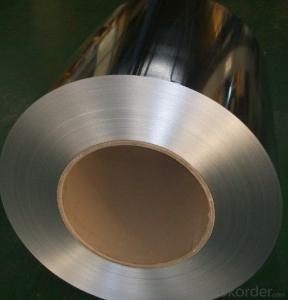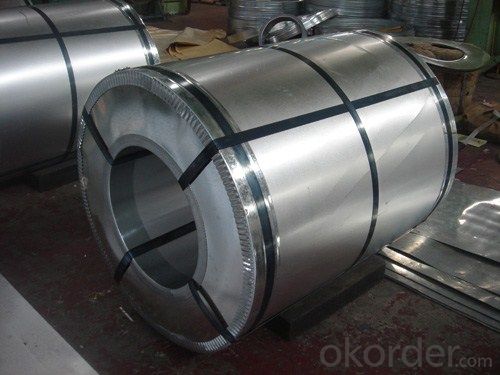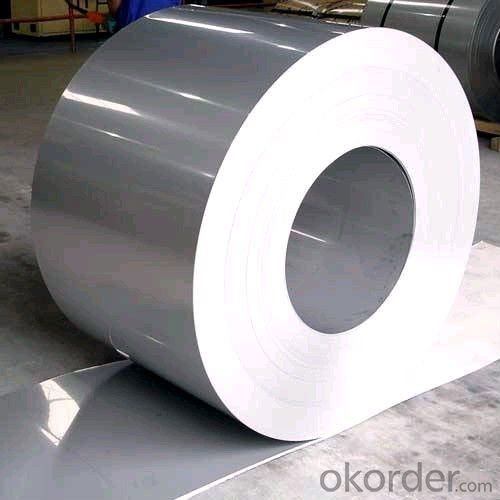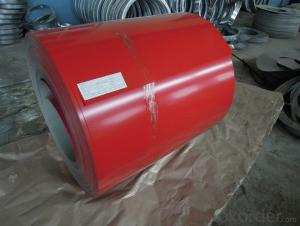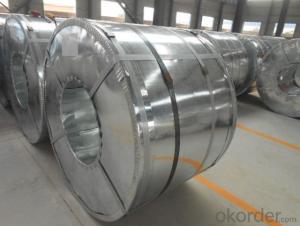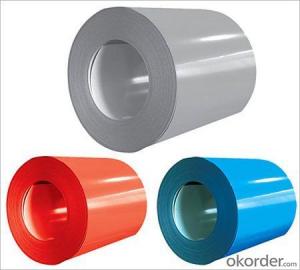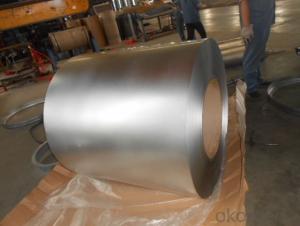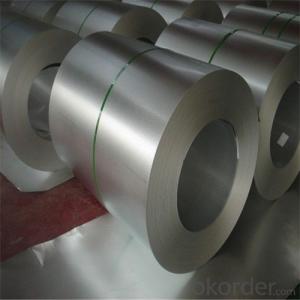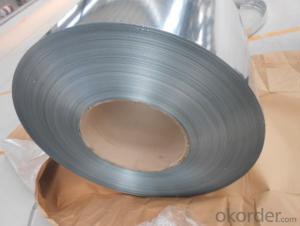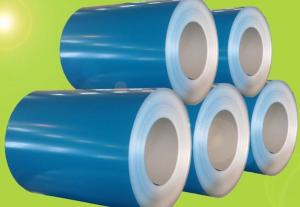Prime Aluzinc Steel Coil in High Quality
- Loading Port:
- Shanghai
- Payment Terms:
- TT OR LC
- Min Order Qty:
- 200 m.t.
- Supply Capability:
- 10000 m.t./month
OKorder Service Pledge
OKorder Financial Service
You Might Also Like
1.Structure of Galvanized Steel Coil Description:
Hot-dip galvanized steel coils are available with a pure zinc coating through the hot-dip galvanizing process. It offers the economy, strength and formability of steel combined with the corrosion resistance of zinc. The hot-dip process is the process by which steel gets coated in layers of zinc to protect against rust. It is especially useful for countless outdoor and industrial applications.
2.Main Features of the Galvanized Steel Coil:
• Base material for countless outdoor and industrial applications
• High corrosion resistance
• High strength
• Good formability
• Rust- proof ability
• Good visual effect
3.Galvanized Steel Coil Images
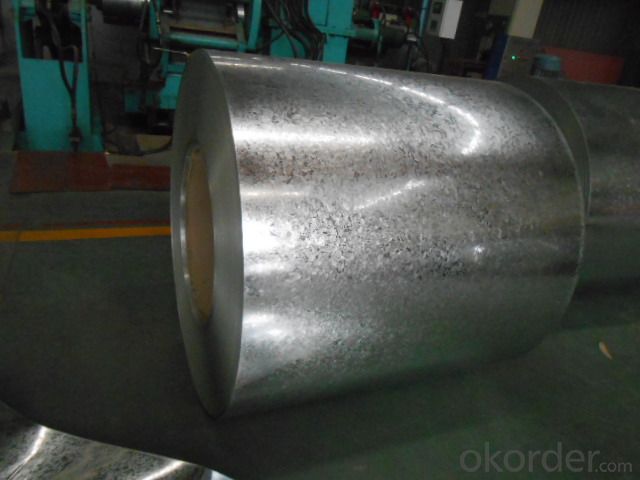
4.Galvanized Steel Coil Specification
Operate Standard: ASTM A653M-04/JIS G3302/DIN EN10143/GBT 2518-2008
Grade : SGCD,SGCH, Q195,DX51D
Zinc coating :40-180g( as required)
Width:914-1250mm(914mm, 1215mm,1250mm,1000mm the most common)
Coil id:508mm/610mm
Coil weight: 4-10 MT(as required)
Surface: regular/mini/zero spangle, chromated, skin pass, dry etc.
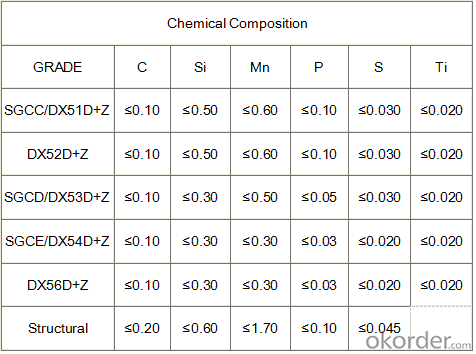
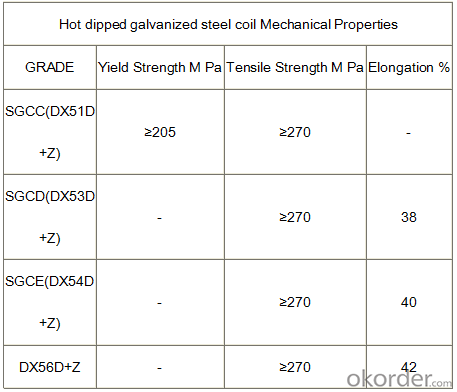
5.FAQ of Galvanized Steel Coil
We have organized several common questions for our clients,may help you sincerely:
1.How to guarantee the quality of the products?
We have established the international advanced quality management system,every link from raw material to final product we have strict quality test;We resolutely put an end to unqualified products flowing into the market. At the same time, we will provide necessary follow-up service assurance.
2. What is the minimum order quantity ?
Our MOQ is 50mt for each size. And we will consider to give more discount if you make big order like 1000 tons and more. Further more, the more appropriate payment term your offer the better price we can provide.
3.How long can we receive the product after purchase?
Usually within thirty working days after receiving buyer’s advance payment or LC. We will arrange the factory manufacturing as soon as possible. The cargo readiness usually takes 15-25 days, but the shipment will depend on the vessel situation.
- Q: I have heard using the BRASS casing is the best thing for an AR-15? Should i just use Brass or Steel?
- Many people have to jam a cleaning rod muzzle end first, using a hammer to bang out steel cased ammo out of an Ar rifle. This has happened to me 3 times and will Never happen again. It said its harder on the extractor, well that is not so but the case will be badly damaged by the extractor and I don't think that is a good thing for any extractor. Any individual pushing steel cased ammo must be selling it...Don't Buy It!!!
- Q: How do steel coils contribute to the construction industry?
- Steel coils are essential in the construction industry as they are used to manufacture a wide range of structural components and materials. These coils are transformed into beams, pipes, sheets, and other forms, providing the necessary strength and durability required for construction projects. Steel coils also offer versatility, allowing for customization and adaptation to meet specific project requirements. Their contribution to the construction industry is undeniable, as steel coils form the backbone of many structures, ensuring stability, safety, and longevity.
- Q: What are the dimensions of steel coils used in the storage system industry?
- The dimensions of steel coils used in the storage system industry vary depending on the specific requirements of the storage system and the industry it is used in. However, common dimensions for steel coils used in storage systems can range from 0.15mm to 3.5mm in thickness, and from 600mm to 2100mm in width. The length of the coils can also vary, typically ranging from 1000mm to 6000mm.
- Q: How do steel coils contribute to the transportation industry?
- Steel coils play a significant role in the transportation industry due to their versatility and durability. These coiled steel sheets are used for various purposes, such as manufacturing automobiles, shipping containers, and railway cars. In the automotive industry, steel coils are used to produce various components, such as body panels, chassis, and engine parts. The strength and malleability of steel make it an ideal material for ensuring the safety and durability of vehicles. Additionally, steel coils are used in the manufacturing of shipping containers that are used to transport goods across the globe. The sturdiness and resistance to corrosion provided by steel coils ensure the protection of goods during transportation. Furthermore, steel coils are crucial in the railway industry. They are used to manufacture railway cars, including freight cars and passenger coaches. The strength and durability of steel make it ideal for withstanding the heavy loads and harsh operating conditions experienced by railway vehicles. Steel coils also contribute to the construction of railroad tracks and bridges, providing the necessary strength and stability for safe and efficient transportation. Overall, steel coils are essential in the transportation industry as they provide the necessary strength, durability, and versatility required for the manufacturing of various transportation vehicles and infrastructure. Their contribution ensures the safety, reliability, and efficiency of transportation systems, making them indispensable in the modern world.
- Q: They are showing on tv a special on how the new World Trade Center, building 1, is being built. Focusing on the steel and the guys fitting everything together.Where do builders go to buy all that steel framing? We do not build really tall buildings where I live so most of the steel is cut and welded on the job site. At World Trade Center 1, they seem to get the steel on trucks; already cut and welded.
- The steel is all custom fabricated in what are called structural steel fabrication shops. Each Building is designed by architects then the frame is designed by engineers to support whatever load is being applied to the building. After the engineering is done it goes out for a bid package where a fab shop estimates how much to charge for the fabrication of the steel and the erection of the steel. Once a company wins the bid, it then has to design how the steel will connect with one another and have it approved by an engineering firm to assure the connections are strong enough. Once all of that happens the fab shop orders raw steel beams and angle iron and steel plate at stock lengths. Beams are then cut into the right length and holes drilled in the proper places. The beam is then marked with a number that tells the erectors where it goes. The steel is then shipped out in batches to the construction site where it is unloaded and shook out into an organized place to grab them with a crane. They are then put together like a toy model, there are instructions that say what beam goes where and what size bolt to use. The welding you see being done is on really critical moments that need extra strength. That is about how it goes in a nutshell. It is a bit more complicated than that but it gives you an idea.
- Q: How are steel coils processed and shaped into different products?
- Steel coils are processed and shaped into different products through a series of manufacturing techniques. First, the coils are uncoiled and straightened to remove any deformities. Then, they go through processes like cutting, slitting, or shearing to achieve the desired width and length. Next, the steel is shaped using techniques like rolling, bending, or stamping to create specific profiles, such as sheets, plates, or tubes. Additionally, various heat treatments and surface finishes can be applied to enhance the strength, durability, and appearance of the steel products. Overall, a combination of mechanical, thermal, and chemical processes is employed to transform steel coils into the wide range of products we see in industries like construction, automotive, and manufacturing.
- Q: What are the common tests performed on steel coils for quality assurance?
- There are several common tests performed on steel coils for quality assurance purposes. These tests help ensure that the steel coils meet industry standards and customer requirements. One of the most common tests is the dimensional inspection. This involves measuring the length, width, and thickness of the steel coils to ensure they meet the specified dimensions. Any deviations from the required dimensions can indicate a quality issue. Another important test is the visual inspection. This involves a thorough examination of the steel coils for any defects or surface imperfections such as scratches, dents, or rust. Visual inspection is crucial to identify any visual defects that might affect the performance or appearance of the steel coils. Additionally, mechanical tests are performed to assess the strength and durability of the steel coils. Tensile tests are conducted to measure the maximum amount of force the steel can withstand before breaking. This test helps determine the steel's tensile strength, yield strength, and elongation properties. Another mechanical test commonly performed is the hardness test. It measures the steel's resistance to indentation, which is an indicator of its strength and toughness. Hardness tests are typically conducted using methods such as Rockwell, Brinell, or Vickers. Corrosion resistance is also an important aspect of steel coil quality assurance. This is typically evaluated through tests such as salt spray or humidity tests. These tests simulate harsh environmental conditions to assess the steel's ability to resist corrosion. Lastly, chemical composition analysis is performed to ensure that the steel coils contain the required elements in the specified proportions. This analysis helps verify that the steel meets the desired chemical properties, which can significantly impact its performance and suitability for specific applications. Overall, these common tests performed on steel coils for quality assurance purposes help ensure that the coils comply with industry standards, customer requirements, and are fit for their intended use.
- Q: How are steel coils used in the production of electrical transmission poles?
- Steel coils are used in the production of electrical transmission poles as the primary material for constructing the pole itself. The steel coils are typically cut and shaped into the desired dimensions, then welded together to form the pole structure. This provides strength, durability, and stability to withstand the load and environmental conditions associated with electrical transmission lines.
- Q: I am looking for steel. I need a lot.
- Ryerson-Tull sells all sorts of steel. As does Liebovitch. I'm not what the phone numbers are to these places, but I'm sure you could find them on the internet.
- Q: How do steel coils contribute to sound insulation in buildings?
- Steel coils can contribute to sound insulation in buildings by absorbing and reducing sound vibrations. The coils act as barriers, preventing the transmission of sound waves and minimizing noise transfer between different areas of a building.
Send your message to us
Prime Aluzinc Steel Coil in High Quality
- Loading Port:
- Shanghai
- Payment Terms:
- TT OR LC
- Min Order Qty:
- 200 m.t.
- Supply Capability:
- 10000 m.t./month
OKorder Service Pledge
OKorder Financial Service
Similar products
Hot products
Hot Searches
Related keywords
